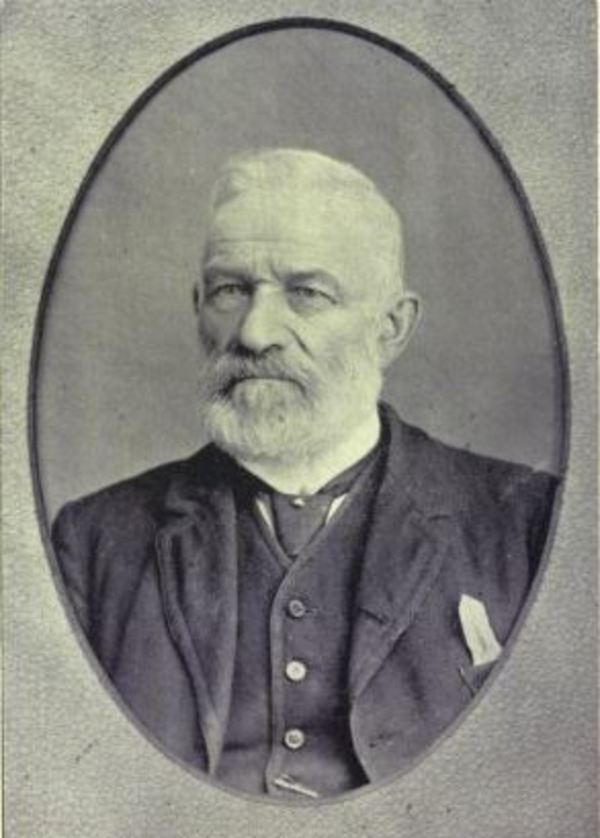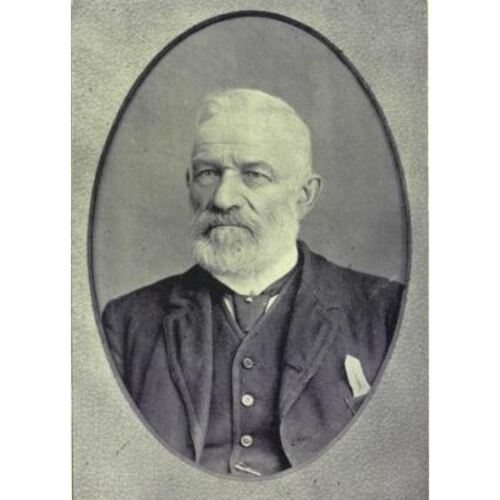
Source: Link
MERNER (Muerner, Mürner), SAMUEL, blacksmith, businessman, politician, and jp; b. 9 Jan. 1823 in Kien, Canton of Bern, Switzerland, son of Jakob Emanuel Muerner, a farmer, and Susanna Schluchter; m. first November 1845 Maria Ann Grasser (d. 1890), and they had seven sons and seven daughters; m. secondly 1898 Ellen Sararus, née Fletcher; d. 11 Aug. 1908 in Berlin (Kitchener), Ont.
Samuel Merner attended school in Reichenbach in the central Swiss Alps. He immigrated to Upper Canada with his family in 1837, settling in what would become Waterloo County, where Germans and the German language were common. Jakob Muerner located on a bush farm on Bleam’s Road, about two miles east of the village of Hamburg. Samuel stayed on the farm for one year and then was apprenticed to a blacksmith in Preston (Cambridge). He became a journeyman blacksmith in 1840 and four years later established his own shop in Hamburg. He expanded it to make wagons and carriages. The business was sold to his brother Frederick in 1856, by which time Samuel had accumulated sufficient capital to establish a foundry in New Hamburg, as the village had become known, and another in Waterloo. He had anglicized his name, as many German families in the area then did.
Merner’s ancestry, however, was no barrier to either success in business or entry into public life in the Waterloo County area. In 1857 he became a member of the council of the newly incorporated village of New Hamburg. He was appointed a justice of the peace in 1862, in which year he purchased the Canadisches Volksblatt, the local German newspaper. As he accumulated public offices – he also served as reeve of New Hamburg (1873–78) and warden of Waterloo County (1878) – his business interests prospered. Though the foundries were turned over to sons in 1873, he still owned two large farms, a major flour-mill and another structure in New Hamburg, and two large buildings in Berlin, where he was associated with William Simpson’s furniture company. He was a founding director of the Economical Fire Insurance Company and a director of several other businesses, including the Preston Furniture Company, the John Hoodless Furniture Warehouse in Hamilton, the Dominion Life Assurance Company, and the Canadian Manufacturing Company, which had taken over the Simpson firm. It was said by the Canadian parliamentary companion that “all Swiss people emigrating to the Western Province [Ontario]” were directed to Merner.
In 1878 he stood for election to the Ontario legislature as a Conservative in the Waterloo South by-election. He lost, but later that year he was elected to the House of Commons for Waterloo South, defeating well-known Liberal James Young*. Merner helped his cause by assisting in the establishment of New Hamburg’s first English newspaper, the New Hamburg Independent. At the next general election, in 1882, he was defeated by James Livingston, a business competitor from nearby Baden. Prime Minister Sir John A. Macdonald* appointed Merner to the Senate on 12 Jan. 1887.
Merner was very much the dominant personality in the life of New Hamburg in the 1870s and 1880s. He and his family lived in a stately residence situated on the Nith River in the centre of the village. After remarrying, in 1898, he moved to Berlin and took up residence in the Brunswick Hotel, which he owned. His health declined quickly after the move, as did his personal fortune, the result of “reverses” and the failure of his endorsements “for others”; he appears to have tried to commit suicide by taking carbolic acid in 1905. The attempt failed and he actually attended some sittings of the Senate before his death in 1908. Merner was survived by his wife and by four sons and four daughters from his first marriage.
The Berlin News-Record noted his death with the headline “Vital spark passes.” “Honest Sam” Merner had little impact on national politics but, like so many public figures of the time, he significantly affected the community in which he lived. A biographer described him as “a typical Swiss burgomeister who achieved wealth and distinction in the New World.” That success was the result not of Merner’s abilities but of the fact that his small part of the New World had a Germanic tradition that allowed a German-speaking immigrant to flourish. In that sense, he was not so typical of his times in Canada.
AO, RG 22, ser.211, reg.M, no.5196. Univ. of Waterloo Arch. (Waterloo, Ont.), L. J. Breithaupt, diaries, 1905. Waterloo Hist. Soc. (Kitchener, Ont.), Merner file; “Mürner, Muerner, Merner: genealogy and related branches,” comp. Ruth Merner Connell (1976). Canadisches Volksblatt (New Hamburg, Ont.), 12 Aug. 1908. News-Record (Berlin [Kitchener]), 11 Aug. 1908. E. H. Bovay, Le Canada et les Suisses, 1604–1974 (Fribourg, Suisse, 1976). Can., Senate, Debates, 1887–1909. Canadian album (Cochrane and Hopkins), 2: 364. Canadian biog. dict. CPG, 1879, 1883, 1903–9. Cyclopædia of Canadian biog. (Rose and Charlesworth), vol.1. E. H. Devitt, “Hon. Samuel Merner,” Waterloo Hist. Soc., Annual report, 1940: 139–41. Directory, Waterloo County, 1877/78: 149. Alexander Fraser, A history of Ontario: its resources and development (2v., Toronto, 1907). More than a century in Wilmot Township, [comp. Florence Diamond et al. ] ([New Hamburg, 1967]). Newspaper reference book.
Cite This Article
John English, “MERNER (Muerner, Mürner), SAMUEL,” in Dictionary of Canadian Biography, vol. 13, University of Toronto/Université Laval, 2003–, accessed December 20, 2025, https://www.biographi.ca/en/bio/merner_samuel_13E.html.
The citation above shows the format for footnotes and endnotes according to the Chicago manual of style (16th edition). Information to be used in other citation formats:
| Permalink: | https://www.biographi.ca/en/bio/merner_samuel_13E.html |
| Author of Article: | John English |
| Title of Article: | MERNER (Muerner, Mürner), SAMUEL |
| Publication Name: | Dictionary of Canadian Biography, vol. 13 |
| Publisher: | University of Toronto/Université Laval |
| Year of publication: | 1994 |
| Year of revision: | 1994 |
| Access Date: | December 20, 2025 |



